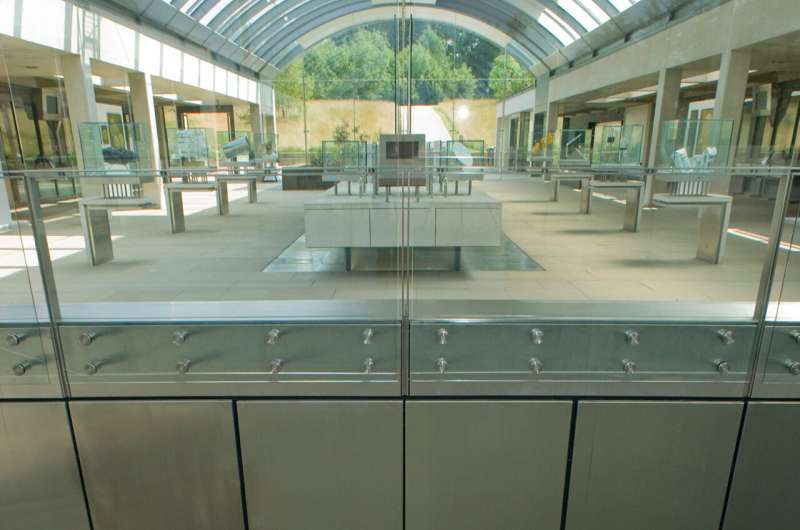
Entrance to the underground vaults at the Millennium Seed Bank. Credit: RBG KEW
A world-leading seed conservation program led by the Royal Botanic Gardens, Kew is celebrating a major milestone today in its efforts to preserve rare, threatened, and important wild plants. As of March 1, the Millennium Seed Bank (MSB) has banked more than 2.4 billion individual seeds representing a total of 40,020 different species of wild plants.
Described by scientists as “Noah’s Ark for plants,” the MSB is the world’s biggest wild seed storage facility, situated at the heart of Kew’s ‘living laboratory’ and wild botanic gardens, Wakehurst, in rural Sussex. Within the bomb- and flood-proof building are 98,567 seed collections sourced from 190 countries and territories, across all seven continents, nine biogeographic regions, and 36 biodiversity hotspots. In fact, the MSB holds the Guinness World Records title for world’s “largest seed bank.”
Dr. Elinor Breman, Senior Research Leader at the Millennium Seed Bank, says, “Housed within the vaults of the Millennium Seed Bank is the world’s largest and most diverse collection of plants anywhere on the planet and that makes it an invaluable tool for scientists tackling the global biodiversity crisis. The path towards banking 40,000 individual species has been both challenging and rewarding and we are confident the coming years will prove just as fruitful. Conserving seeds at the MSB is not just about chasing numbers, it’s about increasing the genetic diversity of the collections and unlocking their potential to solve some of the biggest challenges we face today, from biodiversity loss to food security to climate change.”
Lord Benyon, the UK Government’s Minister for Biosecurity, says, “Kew’s world leading collection of diverse plants will be an important tool in tackling the challenges facing our nation today, including maintaining our food security, biosecurity loss and climate change. This landmark collection acts as a further example of Great Britain’s position as a global leader in plant biosecurity and sets an example for the world to follow.”
Among the most recent additions to the seed bank, pushing the number of collected species over 40,000, are wild plants from Madagascar, Pakistan, and the Caucasus. These include the critically endangered baobab Adansonia perrieri, or Perrier’s baobab, and the endangered Erythrophleum couminga, a leguminous tree endemic to the Bare de Ball National Park on the west coast of Madagascar. Although the stems and leaves of the latter are known to be used as a cardiac tonic, the plant is highly poisonous in high doses and its bark extract can cause shortness of breath, seizures, and even cardiac arrest.
Other recent highlights include a number of orchid species collected throughout the Caucasus region, such as Orchis coriophora, where the MSB is coordinating a dedicated seed conservation program in Armenia. Orchid seeds are particularly tricky to collect and conserve as they are the smallest in the world, a single plant producing millions of dust-like seeds. Because of their minuscule size, they lack a food reserve and are generally unable to germinate on their own. Instead, many species rely on fungal partners—so-called mycorrhizal relationships—to germinate. Orchid seeds are also difficult to store but researchers at the MSB and in partner countries are developing new methods to maximize their longevity.
2023-03-10 16:00:07
Link from phys.org
Kew’s Millennium Seed Bank (MSB) has achieved a significant milestone: storage of 40,000 different species of plants, making it the largest and most diverse seed bank in the world. Dubbed as the “Noah’s Ark for plants,” the MSB is an international collaboration aimed at conserving the world’s plant heritage for future generations.
Established in the year 2000, the MSB was created with the primary objective of conserving seeds from the world’s most threatened plant species, as a means of preventing their extinction. The initiative was born out of a recognition that plant populations the world over are dwindling fast due to habitat loss, climate change, and other human activities. To date, the MSB has propagated and stored seeds from more than 170 countries, including tropical rainforests, deserts, and alpine regions.
Reaching the 40,000 species milestone is a testament to the decades of hard work and dedication that has gone into building and maintaining the seed bank. The MSB team has collaborated with farmers, botanists, and conservationists from around the globe to source and collect seeds, which have then been stored in the giant vaults beneath the Sussex countryside. This enormous collection of plant seeds is kept at a constant temperature and humidity to ensure their long-term survival.
The seed bank not only serves as a safe repository for plant species, but it also plays an essential role in research and conservation efforts. Scientists from around the world can access the seeds to conduct experiments and research into plant genetics, plant breeding, and sustainable agriculture. The knowledge gained from this research can help to identify new crop varieties, combat diseases, and mitigate the effects of climate change.
In recent years, the MSB has extended its global reach, providing expert advice and training to other seed banks and conservation organizations. This sharing of knowledge and resources is crucial in ensuring the preservation of the world’s plant species for generations to come.
The importance of the MSB’s work cannot be overstated. With the global population set to reach 10 billion by 2050, the world will face unprecedented food and resource demands. The MSB is playing a critical role in safeguarding the future of the world’s plant species, ensuring that they are available to help meet these challenges.
In conclusion, Kew’s Millennium Seed Bank is a shining example of international cooperation and scientific innovation. Its achievements in conserving the world’s plant heritage are a testament to the dedication and hard work of the MSB team and its global partners. With 40,000 plant species now safely stored, the MSB is truly the Noah’s Ark for plants, providing hope for a more sustainable and resilient future.



















